Tag: local farmers
Keerai Farm: Connecting With Agricultural Traditions and a Diverse Community
At Keerai Farm in Enumclaw, Victor Anagli and Deepa Iyer are building on their families’ farming and cultural traditions. Victor’s family has been growing food for generations in his birthplace, Denu village in Ghana. Deepa’s ancestors lived among rice fields in southern India, and her family has strong cooking traditions.
"I want to rescue my cultural traditions and those of my friends and collaborators," Deepa said. "We all have deep cultural traditions related to food and farming, yet in our industrial system, many of us lose those traditions in exchange for industrially produced food that often has negative impacts on the land, water, and the people who work to grow, process, and sell the food. Not to mention that our children become addicted to packaged and processed food, to eating on the run out of a paper bag or box, rather than having a way of life that allows us time to grow the food, harvest together, celebrate the bounty, give thanks together, share meals, and lift up our ancestors."
An engineer by training, Victor left his corporate job to get back to his agricultural roots. Deepa has worked as a naturalist and food systems educator, and is currently a program coordinator with IRC’s New Roots program—FIN’s partner in organizing Tukwila Village Farmers Market and Namaste Farm Stand. In addition to supporting the Namaste Garden and Namuna Garden growers who sell food at our markets, Deepa has also shared some of Keerai Farm's abundance at Tukwila Village Farmers Market.
Deepa and Victor bought their 21-acre property in 2018, and they’re already growing some of the same foods their ancestors ate, such as roselle, bottle gourds, peanuts, and okra. The couple take produce requests from community members, including Deepa’s mother’s Indian community and Tukwila Village Farmers Market customers. They're experimenting with small greenhouses and organic agricultural techniques as they learn how to grow these culturally significant foods in the Pacific Northwest’s climate.
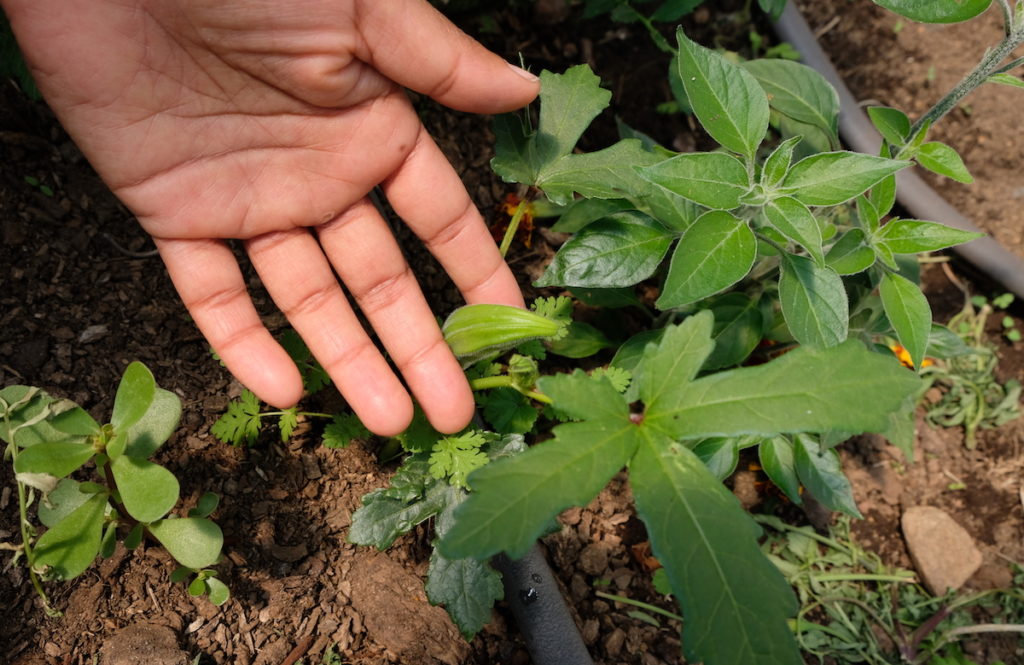
Growing community
"Keerai Farm is our dream: living life close to the land, connected to the Earth, caring for her each day we wake up, seeing our children run free and breathing fresh air, eating real food coming straight from the soil and grown with love and care," Deepa said.
Deepa and Victor’s children are already well acquainted with farm life. Their 15-year-old son, Devon, loves tinkering with machinery, and helped install their irrigation system. He’s also creative in the kitchen, and surprised their family with tasty popsicles made from homegrown berries he’d collected. Their 3-year-old daughter, Samika, has learned to identify many of the plants they grow, and loves riding on their tractor as they cut grass.
Victor and Deepa want to share the experience of farming with other families--particularly those who have a hard time accessing land because of displacement or economic reasons, or because they don't feel socially or physically safe living in a rural area.
"This is why we focus our work on connecting with BIPOC (Black-indigenous-people of color) families—because in King County there is diversity, but many folks of color do not own land and/or do not feel comfortable or have a space that feels welcoming to come and connect to the land," Deepa said. "We hear this from so many people who come to visit: 'We would love to live this way but we are not comfortable.' Well, if we could live in community, then we could keep each other safe and inspired."
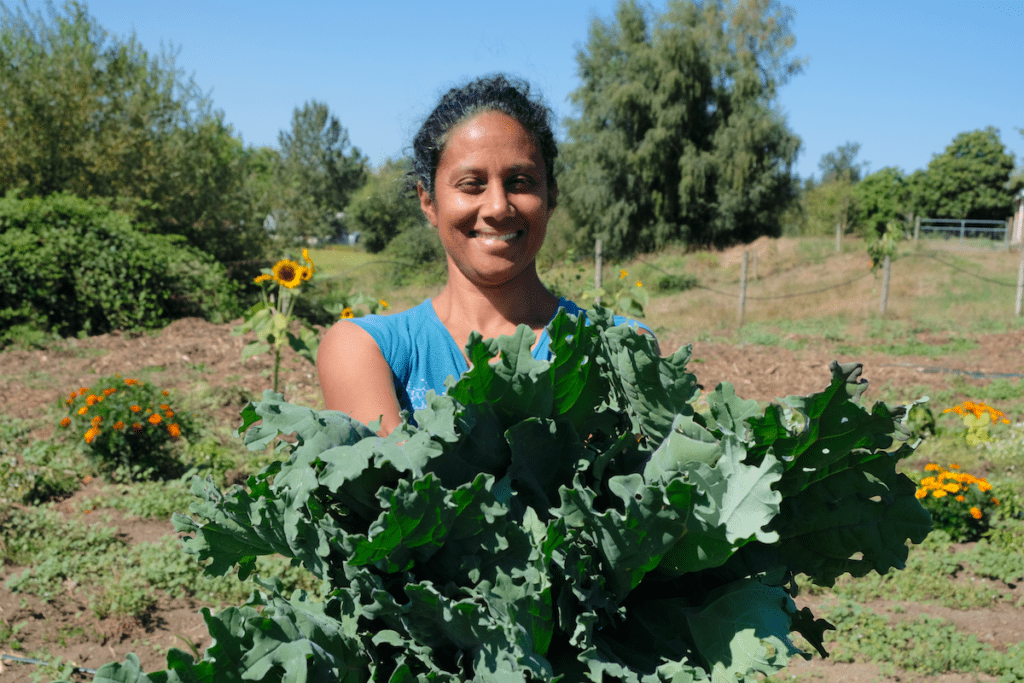
Deepa and Victor have been overwhelmed by positive feedback from community members who have visited Keerai Farm. Some have already been inspired to change their eating habits.
"Every time people come here, they taste the produce and say that it tastes different from the stores. That is a hell of a testament," Victor said. "A group came to visit last week and harvested produce and cooked a meal in our kitchen, and then told us that that experience made them want to eat more fruits and vegetables and cook more for themselves."
Victor loves sharing not only fresh food, but also knowledge about organic farming that has been passed to him down through generations.
"I believe growing food authentically without chemical aid is the way to do it. Food is medicine. Food is a healer. If you keep pumping it with fertilizers, that defeats the purpose," Victor said. "It is important that we all know this, for this knowledge to be passed down—the actual doing part, not just reading a book. You have to go through the process with somebody. It is vitally important to share that knowledge."
In addition to inviting community to come farm, Victor and Deepa are organizing events on their property. In June, 90 people spent a weekend practicing capoeira, camping, and enjoying the land at the “Grounded in Freedom” event that Keerai Farm hosted. Deepa and Victor plan to hold more events combining food, community, and healing arts such as yoga.
"Keerai Farm is a place of healing, a place where you are able to come and feel one with nature," Victor said. "My vision for the future: a lot of people, like-minded folks who believe in authentic food, building community, and just being here now, being present together."
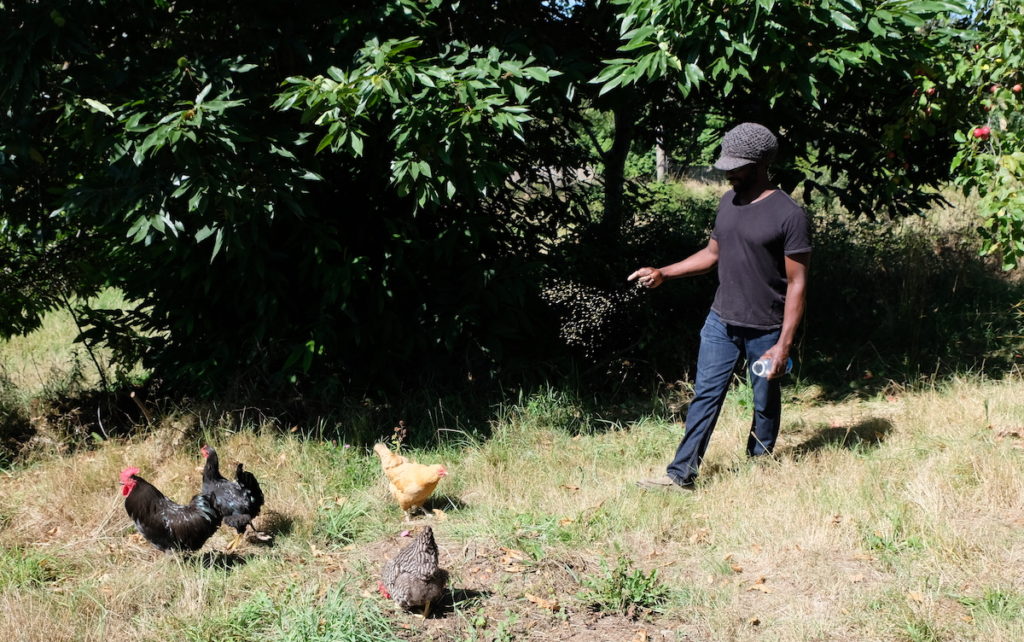
Help harvest at Keerai Farm
Deepa and Victor invite you to experience and help farm their land—and take fresh produce home. You can email Deepa at keeraifarm@gmail.com to set up a visit. It’s harvest season—a great time to be on the farm!
Food Is Medicine at Laura’s Garden
As an acute care nurse, Laura Vogel helps patients who have heart and kidney diseases—conditions she connects to poor diets.
“I see the effects of processed food every day. And it’s not just diabetes—it’s the inflammatory state that food can potentially put you in. You’re just so much more susceptible to disease, and illness, and poor healing if you do get sick,” she said.
Laura believes that eating a diversity of fresh foods can help prevent disease. She’s working to spread the word, and also to share her homegrown produce with her Tukwila neighbors.
“I want to help the community get healthy and not have to come see me at Harborview!” she said. “Food should be our primary medicine—not pharmaceuticals.”
A thriving home garden designed with permaculture in mind
You may have met Laura at Tukwila Village Farmers Market this season. When her schedule allowed, she set up the Laura’s Garden farm stand to sell fresh vegetables, fruits, and herbs grown in her yard just a few blocks from the market.
Embracing permaculture—an agricultural design system modeled on nature—has enabled Laura to cultivate an abundance of produce on a residential property.
“It’s about permanent agriculture, and growing food systems that are sustainable and economical, and better for the environment,” Laura said.
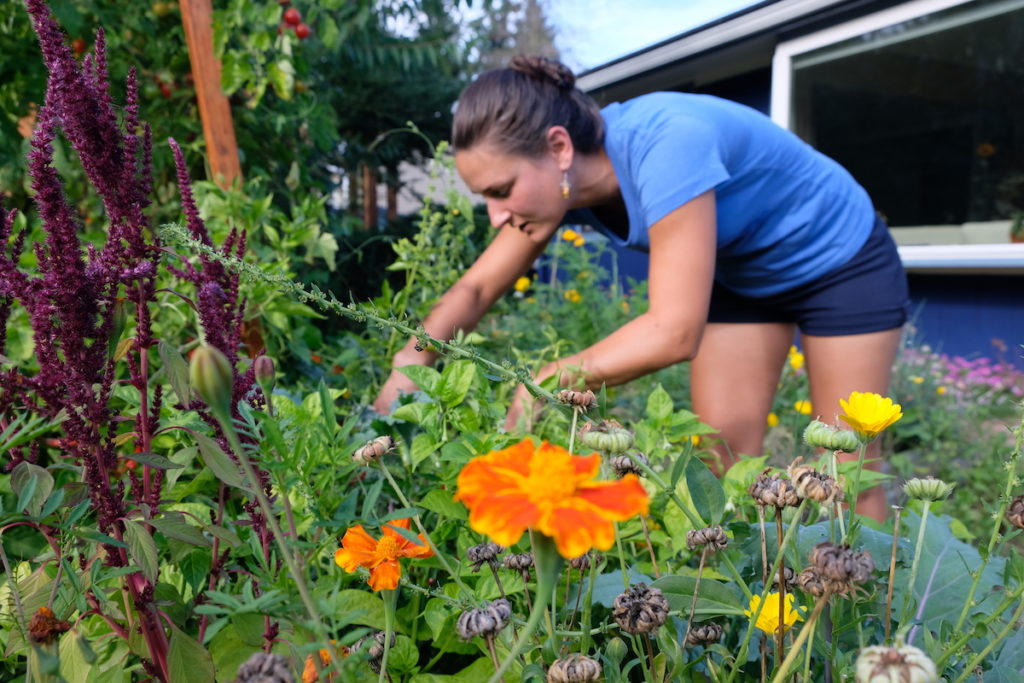
Permaculture rejects monocrops, the modern practice of growing large amounts of a single plant. Natural food systems are diverse, and so Laura’s garden is incredibly varied. Among her edible plants are squash, tomato, asparagus, tomatillo, beans, peppers, chard, gherkins, fennel, sorrel, ginger, tea, hops, tulsi, turmeric, bay leaf, parsley, thyme, oregano, and garlic. She also grows almond, fig, apple, pear, peach, and plum trees, as well as flowers that support pollinators.
It’s easy to spot other elements of permaculture on Laura’s property: a rainwater irrigation system keeps her plants healthy without using city water; wood chip mulch reduces evaporation, suppresses weeds, and conditions soil.
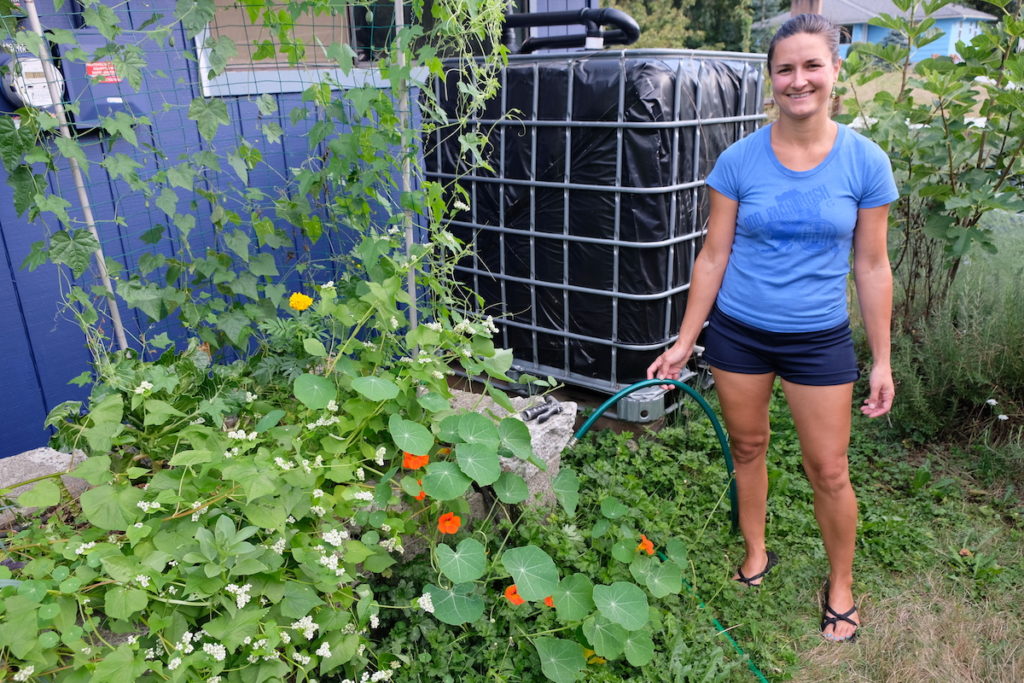
Laura is completing a certificate in permaculture design, and hopes her garden can one day become a permaculture demonstration site to provide inspiration to other gardeners.
“You can do a lot with a little, and I want to show that to other people, so they can also grow a lot of food even in a little space,” she said. “And if you do grow more than you can eat—which happens very quickly—then you can share it.”
Get involved
Participating in the farmers market this year, Laura realized that she didn’t have enough spare time to regularly harvest and prepare her produce for sale. Still, she’d love to share her food with people who will enjoy and benefit from it. Now she is looking for a community member who’d like to harvest her produce and share it with the community.
“It would be a dream come true if someone came to harvest weekly, and either donated to the food bank or set up their own stand,” she said. Laura envisions a learning opportunity for someone interested in permaculture, and a potential income opportunity if that person wanted to sell the food locally.
Would you like to partner with Laura to share her food with our community? Get in touch with her at vogel.laura.k@gmail.com.
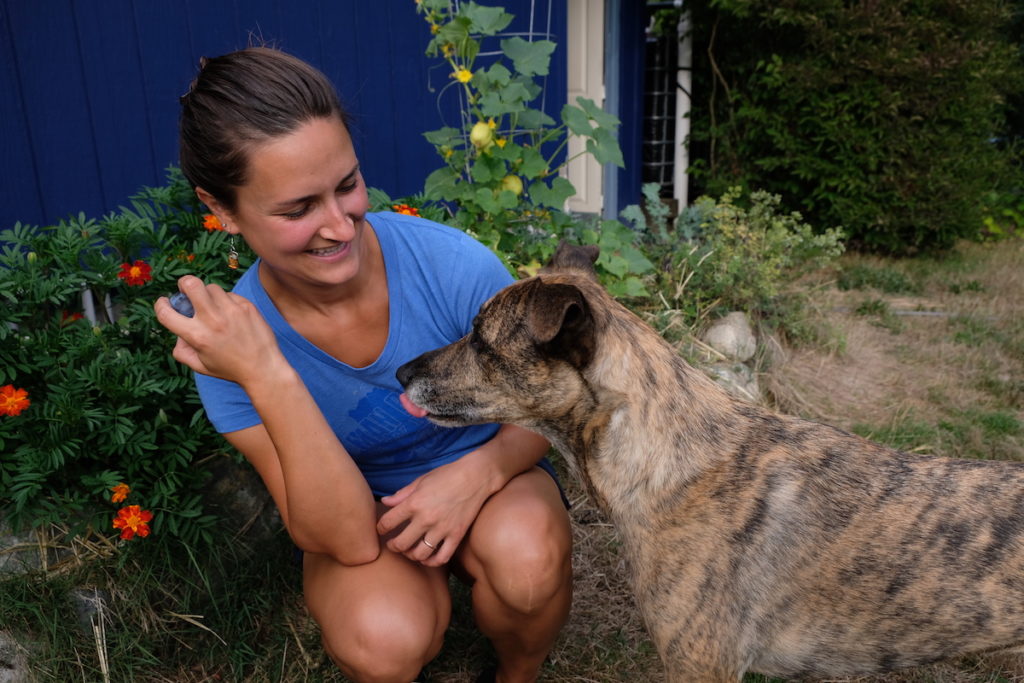
New Roots: Building Thriving Gardens and Communities
“I am very lucky -- my happiness knows no bounds," Krishna Biswa says while walking among rows of healthy lettuce, robust basil, and vibrant beets. His close-knit family and thriving garden plots are among his greatest joys.
“I have a beautiful granddaughter who’s 14 months old," he continues, beaming. "She visits the garden sometimes, and she loves snap peas and cucumbers.”
Krishna’s parents, siblings, and children also enjoy the fresh, tasty produce he grows at Namaste Community Garden and Namuna Garden in Tukwila. For their family, growing and sharing food is a beloved tradition.
Krishna recalls his parents producing corn, greens, rice, cardamom, and oranges in Bhutan, their country of origin. After resettling in South King County as refugees in 2010, they've have been able to garden again thanks to the IRC New Roots program.
New Roots builds on the agricultural experience of many refugee and immigrant families by providing access to land, materials, and education for program participants to grow healthy food. Through a partnership with landowner St. Thomas Catholic Church, IRC began connecting resettled refugees with Namaste Community Garden plots in 2010.
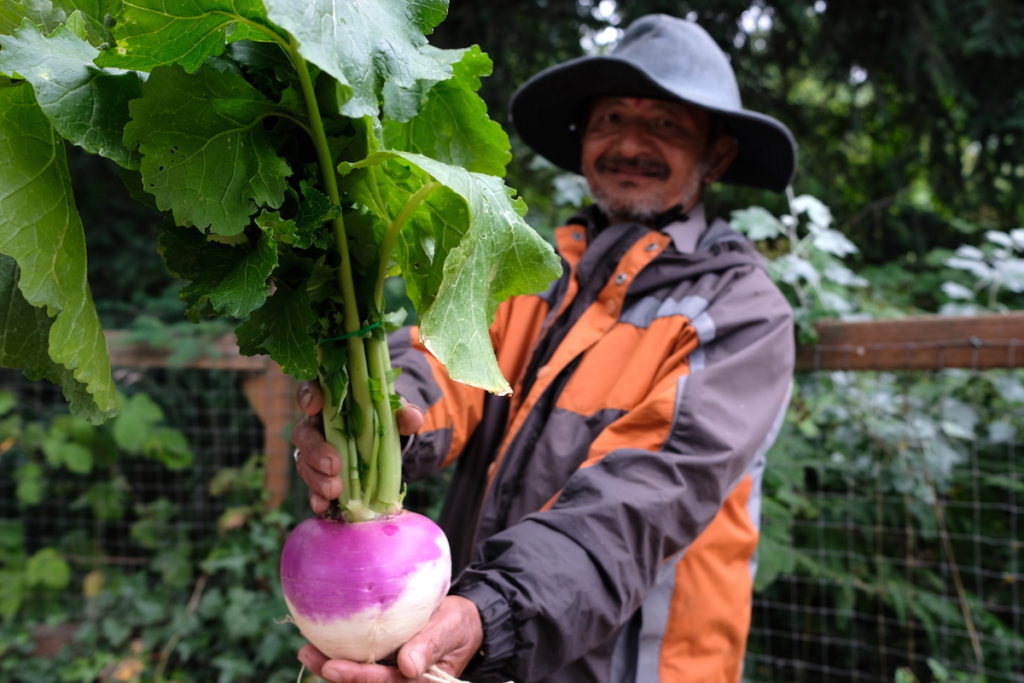
“We are very lucky to have this garden because we are able to practice our gardening traditions, and the produce we grow here is very good,” says Krishna, who started tending a plot at Namaste Community Garden in 2012. “It’s supporting our family and reducing grocery expenses.”
Krishna’s parents and brother also tend plots at Namaste Community Garden, and they love exchanging advice for growing organic food with their fellow gardeners, families from Bhutan and Myanmar.
“I have a lot of friends in Namaste Garden,” Krishna says. “They have their own way of growing, and sometimes I learn from them, and sometimes they learn from us.”
Namuna, an exemplary garden
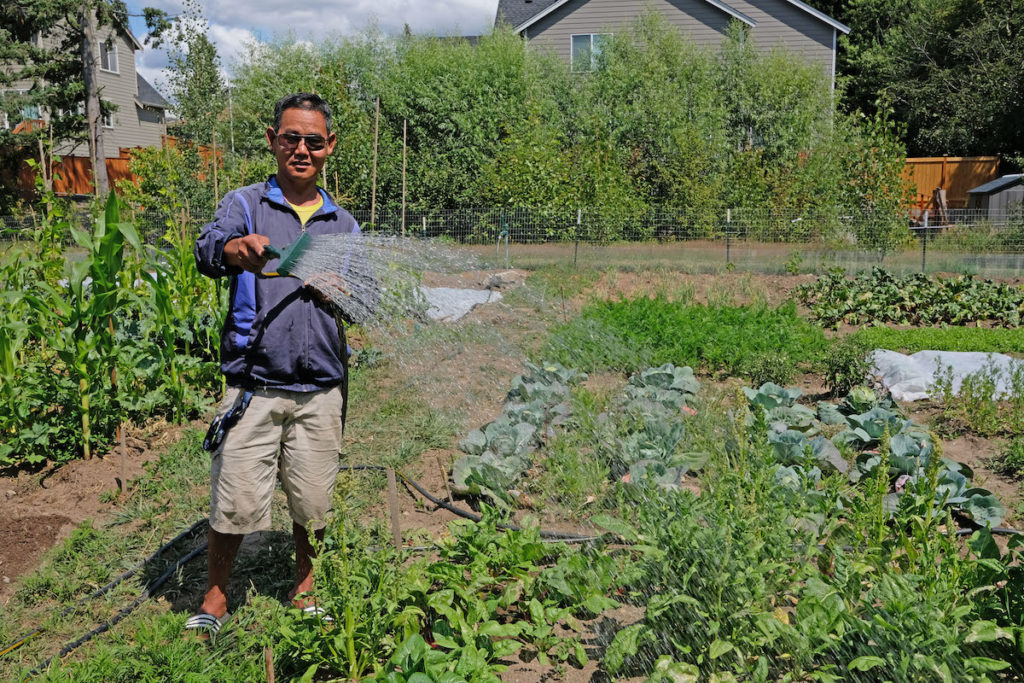
Food Innovation Network partnered with New Roots to start selling Namaste Garden’s produce to community members at Tukwila Village in 2018. That summer, two customers mentioned to New Roots staff member Kamal Adhikari that they had a big backyard in Tukwila that they’d happily make available to growers. Within months, Krishna and four other gardeners were transforming the expansive lawn into a flourishing agricultural space.
They called it Namuna Garden, meaning Example Garden, Kamal explained. It’s an example both of community members sharing their land with growers, and of the excellent produce that can be grown in such spaces.
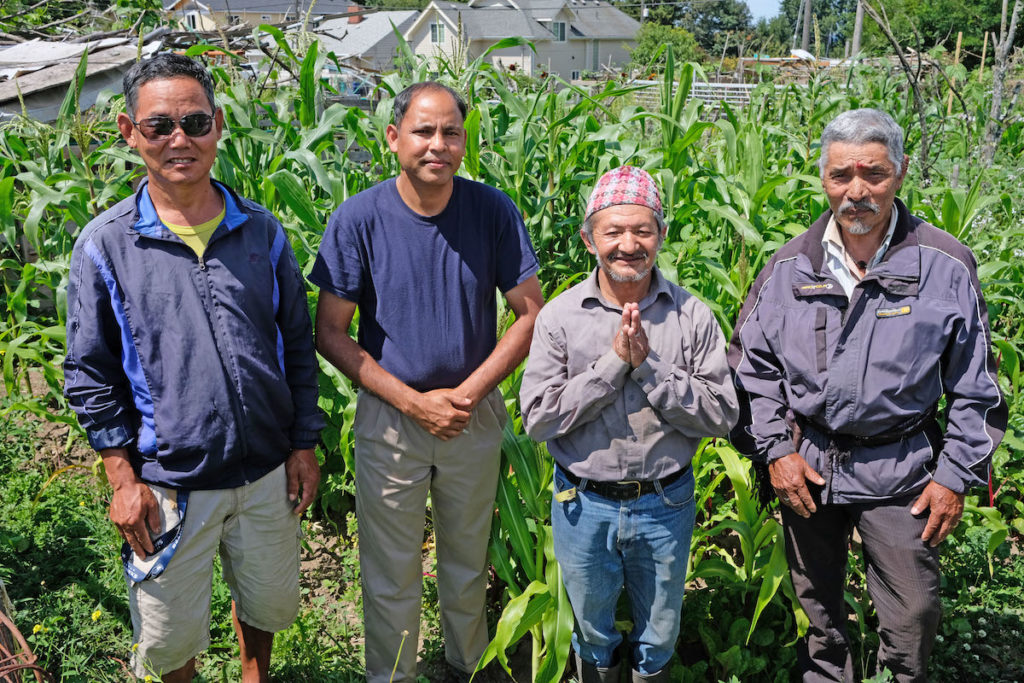
The five growers who tend Namuna Garden are all graduates of New Roots’ Micro-Producer Academy, an eight-week program that teaches budgeting, crop planning, irrigation, and other essential skills. They’re putting their knowledge to work this season at the new Tukwila Village Farmers Market, where they operate booths to sell produce from both Namaste Community Garden and Namuna Garden.
Their produce has been so popular that they sometimes sell out of items within an hour of the market opening. No problem – a grower will head a few blocks to the gardens to harvest more. Food doesn’t get much fresher or more local than that.
“We love bringing good seasonal vegetables to the farmers market,” Krishna says. “We’re happy to see a lot of diverse people there, and to meet customers.”
The gardeners hope that sharing their produce can help spread some of the happiness that they've enjoyed while growing it.
Meet the growers
Namaste Community Garden and Namuna Garden growers sell produce at Tukwila Village Farmers Market on Wednesdays from 4-7 p.m. Come out to meet them, along with Wakulima USA gardeners and other local food producers. And keep an eye on our website for more spotlights on local growers!
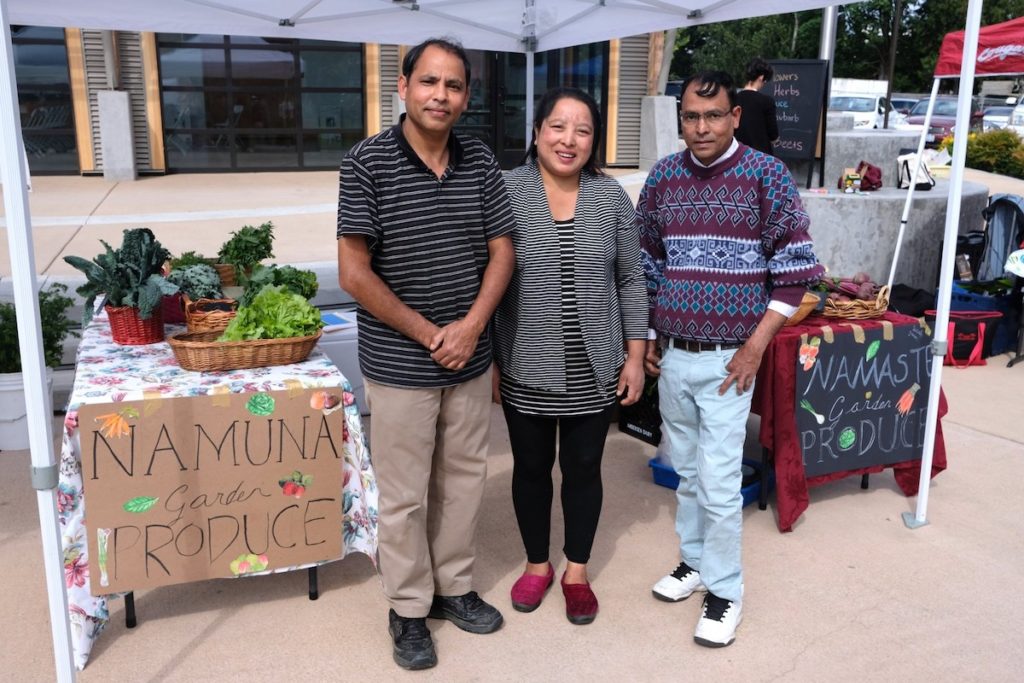
Wakulima USA Supports Local Farmers and Grows Hope
David Bulindah is one of the local food growers you’ll meet at the new Tukwila Village Farmers Market. Together with Dickson Macharia, he co-founded Wakulima USA, a nonprofit that helps immigrants connect with agricultural land and grow crops in South King County.
Wakulima is Swahili for farmers; the organization's name reflects their initial group of eight food growers who are immigrants from east and central Africa.
“We are trying to encourage our farming practices because many of us were farmers in our home countries,” David said. “When we come here, it’s something we find we can be able to do, and that we do out of passion.”
Wakulima USA focuses on growing culturally relevant food – nutritious vegetables that David and Dickson grew up eating in Kenya. Some plants like amaranth and spiderplant are rare in the Seattle area, while others such as kale and collard greens are more common.
David takes inspiration from his mother, an urban farmer in Kenya’s Rift Valley.
“We were too poor to own land, and we lived in the city. But my mother would go up on the side of the road and plant amaranth, corn, and other things. So we were able to survive and get something to eat,” he said.
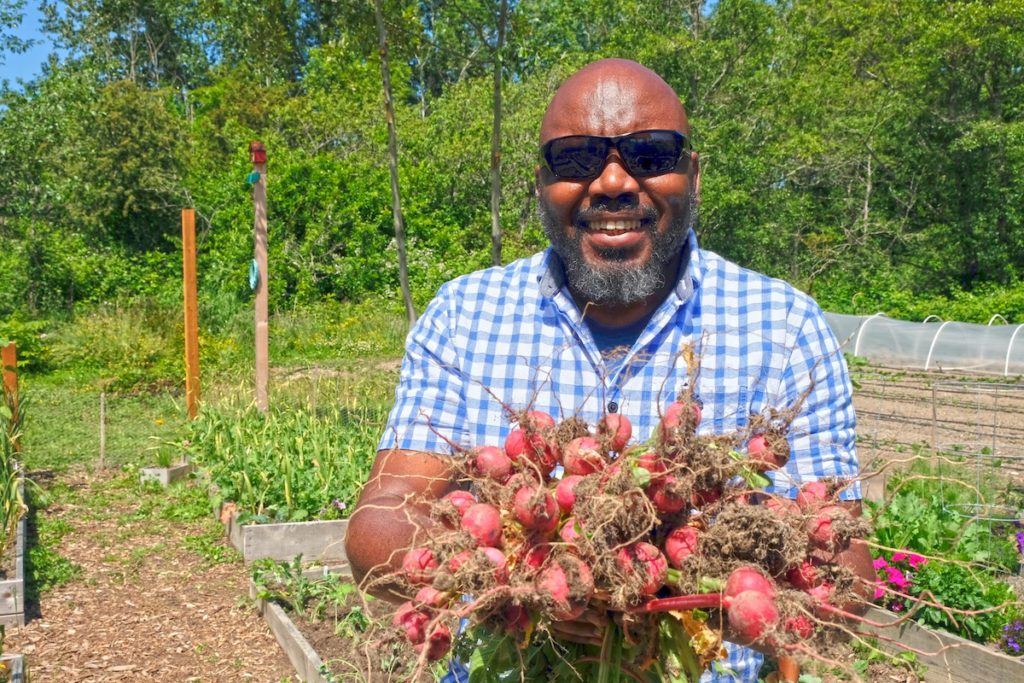
“It gives you a sense of hope”
Now a mental health therapist, David sees farming as a source of nourishment for not only the body, but also the mind.
“It’s therapy for me,” he laughed. “We put the seeds in the ground, and every day we have to water them, and we see how they’re coming up. And then you wake up, you see a tomato there -- it gives you a sense of hope.”
He loves to share the practice of gardening with others, including his children and nieces.
“I bring them here to see how to plant the crops -- because most kids don’t understand where food comes from,” he said.
David’s wife, Irene, agrees that it’s important to pass along farming knowledge to the next generation.
“People need to learn about farming. We kind of walked away from it, but there’s now a big new push to know where this food is coming from. It’s hard to know what’s in it when it’s done by somebody else, somewhere miles away,” Irene said.
For Irene, the flavors of fresh produce are an added benefit: "There's a big difference when you grow your own food. You think it’s a cliché, but the taste is different straight from the garden.”
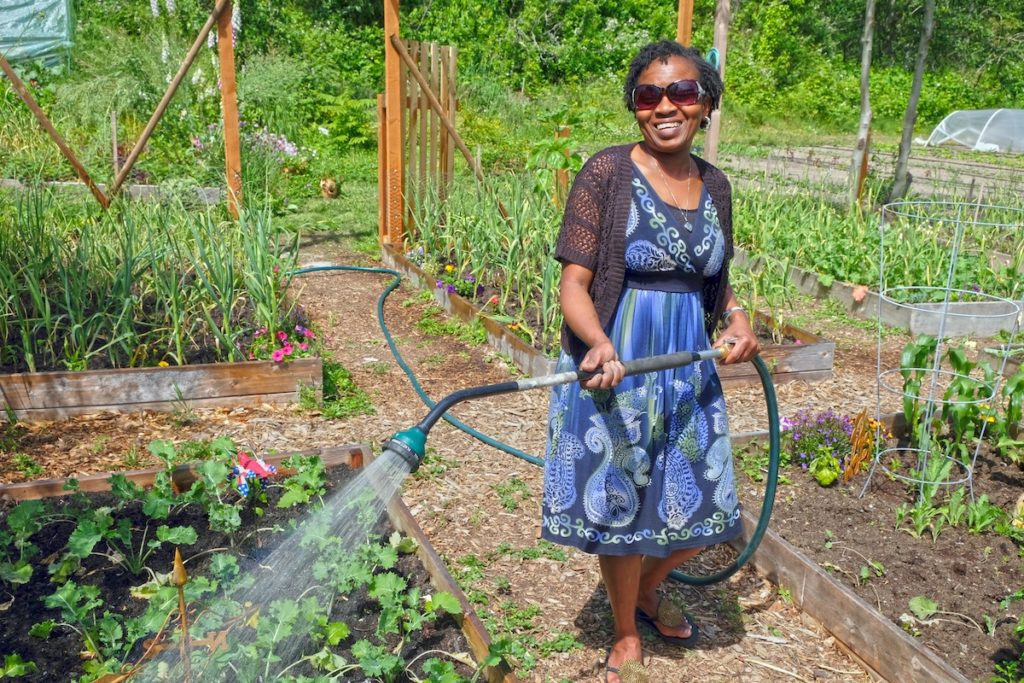
Finding space to grow
Locating agricultural land has been Wakulima USA’s biggest challenge. They reached out to local organizations, and Highline Urban Agricultural Garden helped them connect with a plot at the City of Des Moines’ Sonju Community Garden. Wakulima USA also works land in Kent thanks to World Relief Seattle.
Earlier this year, Wakulima partnered with Highline, King Conservation District, and FIN to present a workshop on farming in King County. Turnout was great, and more than 30 growers have asked Wakulima USA for support to start growing food in our region. The growers are on a waitlist as the organization works to locate more land.
One creative solution Wakulima USA came up with is collaborating with local property owners.
“We're trying to find senior citizens who have space on their property, who used to love gardening, and who can’t do it anymore. We would go there and volunteer, and clean it up, and put in a small community garden,” David said.
As Wakulima USA grows little by little, they have a grand vision for the future: a 20-acre farm with a research center where they would work with scientists to study the nutritional and medicinal values of crops like amaranth. They also envision an on-site restaurant that would give visitors a true farm-to-table experience.
For now, David and the other Wakulima USA farmers are excited to share their delicious, nutritious produce with community members at Tukwila Village Farmers Market.
Connect with Wakulima USA
Are you a property owner who's interested in working with Wakulima USA to build a community garden on your land? Are you looking for opportunities to get involved in community farming? Contact David and Dickson at wakulimausa@gmail.com.
